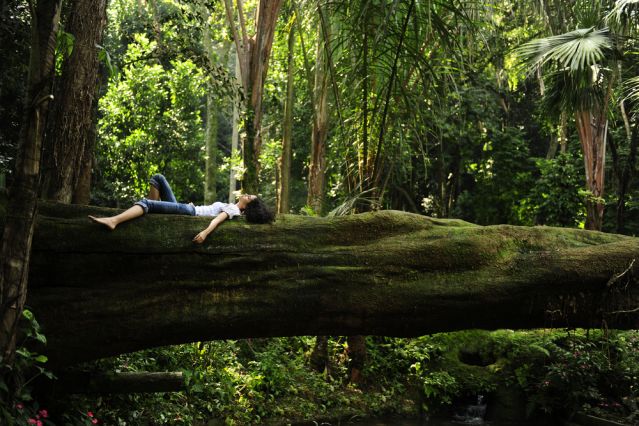Sleep
How to Sleep Consciously
An integrative approach to restorative sleep.
Posted March 26, 2023 Reviewed by Vanessa Lancaster
Key points
- Anxiety that increases at bedtime and upon waking can become a vicious cycle of sleep anxiety.
- Sleep is an altered state of consciousness, but because it is ordinary, we may expect it to “just happen.”
- Ways we can prepare for and integrate the sleep experience include emotional support, bedtime preparation, and integration upon awakening.

Sleep anxiety can spike at bedtime and wake-up time.
Anxiety and other mood problems can spike at bedtime and increase after a bad night’s sleep.1 Poor sleep and anxiety often co-evolve, creating a vicious cycle that is challenging to interrupt. As naturally cyclical as sleep is every 24 hours, it can be difficult to transition from consciousness to unconsciousness (falling asleep) and transition back from unconsciousness to consciousness (waking up).
We ask our children to just go to sleep with no fuss or arguing, yet we often struggle to do so ourselves. Waking up can be a whole other battle, especially when the disorientation and grogginess of sleep inertia last longer than expected. Frankly, it is a lot to ask sometimes to let go of daytime stress enough to fall asleep and then again to wake up and transition into another day. However, there are ways we can prepare for sleep and waking that can make these transitions less effortful.
Remembering sleep is an “altered state of consciousness” may guide us better into and out of it.
Non-ordinary and altered states of consciousness have been making more headlines recently with the rise in interest related to psychedelic-assisted therapies and other non-ordinary states of consciousness that can arise from practices such as breathwork or meditation.2 Sleep is also an altered state of consciousness, however ordinary. This may seem obvious, but we might forget that there are not just two states of consciousness–on or off, but rather many different levels.
Consciousness is a continuum measured by varying degrees of awareness and arousal. For example, EEG shows that Stage 1 sleep appears very similar to brain waves of being awake with high awareness and high arousal. Rapid eye movement (REM) sleep has high awareness but low arousal. Similar to REM sleep, ketamine (a legal dissociative medication used to treat things like addiction and depression) demonstrates high awareness and low arousal. In contrast, typical anesthesia used during surgery shows low arousal with low awareness.3,4
With the development of integrated psychedelic-assisted therapies, the “set and setting” are considered key to providing safe and effective care. This means being intentional about the individual’s state of mind (internal environment), and the context surrounding the individual (external environment) are key to supporting healing. This can also be applied to sleep. Recognizing these and other similarities between sleep and integrative therapies may improve sleep and help wake up better. Below are three ways to sleep more “consciously,”–especially during transition times.
An Integrative Approach to Sleep
1. Emotional Support (supporting “set” or internal state of mind).
- Normalize the feeling of fear or anxiety about sleep. Respect that letting go enough to fall asleep is a lot to ask of our brains and bodies and depends on our stress level.
- Be curious about feelings of failure around sleep and offer unconditional support for yourself no matter what happens.
- Take time to address daytime worries, especially social fears about acceptance, belonging, and feeling relevant.
2. Bedtime Preparation
- Notice what expectations you have about sleep and be aware of how this contributes to sleep anxiety and frustration.
- Control what you can. Set up your environment (bed and bedroom “setting”) for success: cool, dark, quiet, or relaxing sounds, comfortable, and uncluttered.
- Practice the skill of letting go of what you cannot control during the daytime. Name these “uncontrollables.” What would setting them aside make room for?
- Choose that once you close your eyes, you intend to surrender to sleep fully. Practice stillness and trust that you can learn to deeply relax with regular practice.
3. Integration Upon Waking
- Talk or write about your nighttime experience: Note struggles, successes, and surprises. Include dreams, your own interpretation, your felt sense of what occurred, and the meaning this has for you.
- Allow yourself to be in the transition of waking up: Let the first five minutes be self-care – stretch or breathe or just let yourself be unfocused before reaching for your phone. Take a moment to honor what you just did and how challenging it may have been.
- Set one intention for the day: Before your feet hit the floor, name one wish you would like for yourself. How would you like to feel today, regardless of how you slept?
References
1. Cox, R. C., Sterba, S. K., Cole, D. A., Upender, R. P., & Olatunji, B. O. (2018). Time of day effects on the relationship between daily sleep and anxiety: An ecological momentary assessment approach. Behaviour research and therapy, 111, 44–51. https://doi.org/10.1016/j.brat.2018.09.008
2. Cavarra, M., Falzone, A., Ramaekers, J. G., Kuypers, K. P. C., & Mento, C. (2022). Psychedelic-Assisted Psychotherapy-A Systematic Review of Associated Psychological Interventions. Frontiers in psychology, 13, 887255. https://doi.org/10.3389/fpsyg.2022.887255
3. Lee, M., Sanz, L. R. D., Barra, A., Wolff, A., Nieminen, J. O., Boly, M., Rosanova, M., Casarotto, S., Bodart, O., Annen, J., Thibaut, A., Panda, R., Bonhomme, V., Massimini, M., Tononi, G., Laureys, S., Gosseries, O., & Lee, S. W. (2022). Quantifying arousal and awareness in altered states of consciousness using interpretable deep learning. Nature communications, 13(1), 1064. https://doi.org/10.1038/s41467-022-28451-0
4. Cvetkovic, D., Cosic, I. (2011). Sleep Onset Process as an Altered State of Consciousness. In: Cvetkovic, D., Cosic, I. (eds) States of Consciousness. The Frontiers Collection. Springer, Berlin, Heidelberg. https://doi.org/10.1007/978-3-642-18047-7_7


